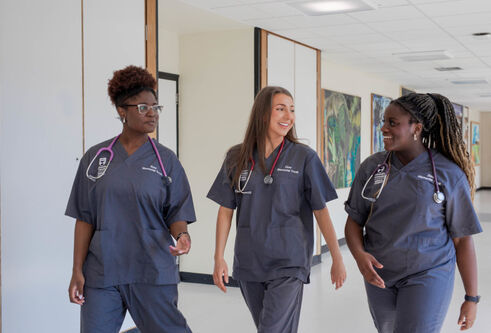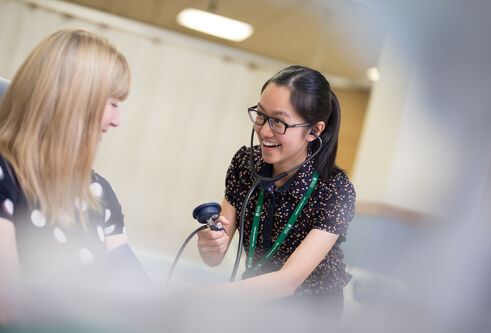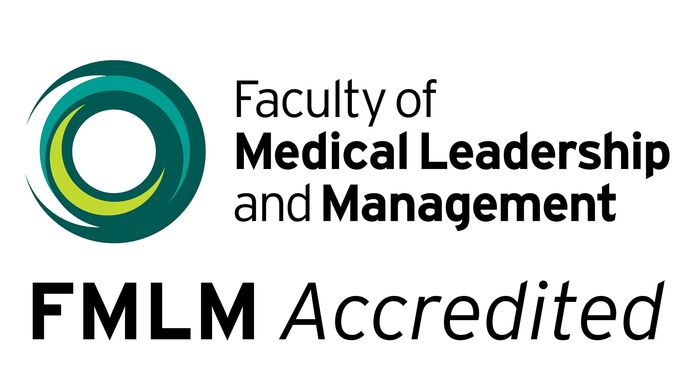Clearing is open. Apply now or call +44(0)1382 386386
Medicine MBChB
Become a confident doctor, fully prepared for practice. Develop a flexible, patient-centred style of care, underpinned by scientific and clinical knowledge

Start date
September 2025
Duration
5 years
UCAS Code
A100
Location
Dundee City Campus / Ninewells Hospital
Top in Scotland and 2nd in UK for Medicine
The Times & Sunday Times Good University Guide 2025
An MBChB (Bachelor of Medicine, Bachelor of Surgery) is an undergraduate medical degree. You need this degree and two years of foundation training to become a fully qualified doctor in the UK.
Why study Medicine?
A career in medicine and healthcare can be very rewarding. It offers you opportunities in a wide range of specialties from general practice to beyond. Demand for doctors in the UK and globally continues to be strong.
To succeed in your career, you will need expert knowledge and skills. But more than that, you will also need to feel fully prepared to practice and ready to hit the ground running. We have a long history of producing strong, confident graduates who are best placed to do that.
We encourage you to become a ‘doctor from day one’. You get direct clinical experience and use immersive technologies from the beginning.
One of the world’s leading medical schools, we are recognised for the quality of our education, research and impact on society. We consistently rank high in all major league tables.
Our School of Medicine sits within a large National Health Service (NHS) hospital. This means you will be able to access wards and speak to real patients at any time. It also means you learn directly from staff who are working in medical and healthcare roles.
You will get an outstanding education, in a supportive, diverse, and inclusive environment.
What you will learn
Your studies start with a Foundation in Medicine block. You explore the fundamental science that underpins the field of medicine. This helps you start to think like a doctor and begin clinical problem-solving.
Throughout your first three years you will learn about body systems and how they work. Each year builds on your existing knowledge through our spiral curriculum. You revisit core concepts and skills with increasing depth each year.
You will experience placements based in general practice throughout your early years.
You'll learn anatomy by hands-on dissection, using full-body Thiel-embalmed cadavers. Unlike traditionally embalmed cadavers, they keep their flexible, realistic tissue and full joint mobility.
This makes the experience as close to working on a living person as possible. It gives you an experience and understanding that no other medical school in the UK can offer. You'll also develop skills in scalpel handling and suturing (stitching tissue together).
From year one you'll learn how to take a clinical history and perform a clinical examination. We are unusual in teaching this at such an early stage in your studies. This really pays off, giving you a high level of ability and confidence on your clinical placements in later years.
After year three you have the option to intercalate for an extra year to gain a BMSc (Bachelor of Medical Sciences) qualification. Choosing from a range of subjects allows you to tailor your degree and study a topic in more depth.
Whether you decide to do this or not, in years four and five you move into clinical training. This is a series of longer-term placements where you'll work in a clinical setting for a few weeks. This gives you a well-rounded experience in a range of clinical areas. You put your training into practice for real patients in real healthcare settings.
You'll use our Clinical Skills Centre to learn important clinical skills. With its purpose-built replica ward, you'll interact with real and simulated patients. This helps you practice what you would do in real-life situations.
As well as building your practical skills, this helps build your knowledge, confidence, people skills, and resilience. These are all important characteristics for medical professionals.
Our Immersion Room simulates the adrenaline of the emergency room. Here you will tend to simulated patients and administer life-saving care.
We also have a Surgical Skills Centre where you'll learn hands-on skills needed for surgery. This helps you get a good understanding of surgical procedures.
The benefits of studying Medicine with us
We are one of the world's leading medical schools. Our social purpose inspires us to train skilled medical professionals and empathetic healers.
The majority of teaching takes place in Ninewells Hospital, Dundee. This means that your studies are centred around life in a working NHS hospital. This clinical exposure underpins your knowledge. It ensures you develop into a well-rounded junior doctor, fully prepared to practice.
You can feel like a doctor from day one! Interact with real patients on wards from the start of your studies. With our open-door policy for all medical students, you can access the wards and speak to patients at any time. You'll gain a sense of what it is like to work in a real healthcare setting.
The majority of our lecturers are clinicians at Ninewells. If you have a specific interest in an area of medicine, it's often possible to arrange your own ward experiences by speaking to a relevant clinician.
Our learning environment is modern and supportive. It is complemented by several other hospital sites and general practices across Scotland. Our student support services and staff are pioneering, with members of support staff available five days a week.
We have cutting-edge simulation facilities replicating real-life clinical scenarios. We were also the first in Scotland to provide an immersion room for emergency medical training.
We have a huge library of digital resources. These include animations, graphics, and notes to help supplement your learning. We have an in-house medical artist to make sure these are high quality. Many students also contribute to these resources.
The size and structure of our medical school helps you get to know your fellow students and the academics and clinicians teaching you. You'll feel part of our community from the start.
Student Voices
Student blog post
Lemuela shares her highlights of studying medicine at Dundee

Student video
Lemuela shares what influenced her decision to study in Scotland and the incredible experiences she's had so far

Student video
Student Nabeeha explains the hands-on aspects of studying medicine at the University of Dundee.

Work experience
The Medical Schools Council has released guidance to support applicants who are seeking relevant work experience.
The Royal College of General Practitioners (RCGP) has launched a free online platform, Observe GP, designed to support aspiring medics in making informed career choices and in preparing their application for medical school.
Rankings
1st in Scotland and 2nd in UK for Medicine
The Times and The Sunday Times Good University Guide 2025
Joint Top in the UK for Graduate Prospects in Medicine
Complete University Guide 2026
Contact our enquiry team
If you have any questions about the admissions process, studying, or living in Dundee, please contact us
